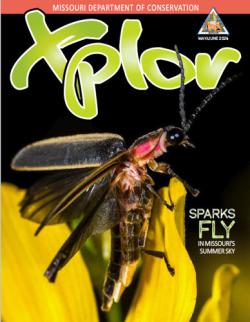
Xplor reconnects kids to nature and helps them find adventure in their own backyard. Free to residents of Missouri.


































Stay in Touch with MDC news, newsletters, events, and manage your subscription

Xplor reconnects kids to nature and helps them find adventure in their own backyard. Free to residents of Missouri.

A monthly publication about conservation in Missouri. Started in 1938, the printed magazine is free to residents of Missouri.


CAPE GIRARDEAU, Mo. -- Landowners who wish to see more wildlife on their property should start with improving wildlife habitat, according to the Missouri Department of Conservation (MDC), and there’s a federal program specifically designed to help landowners with the cost. The Glades and Woodlands Restoration Regional Conservation Partnership Program (RCPP) is a federal program that provides funding specifically for development of glade and woodland wildlife habitat on private land.
In addition to improving habitats for quail, wild turkey and white-tail deer, glades are natural communities which provide high-quality habitat for several priority bird species including the Prairie Warbler, Blue-winged Warbler, Field Sparrow, Northern Bobwhite, Eastern Wood-Pewee. Glades also are important to several plant and animal species of conservation concern such as Yellow Coneflower, Stiff Sunflower, Missouri Primrose and Ladies’-tresses, lichen grasshopper, glade grasshopper and the Eastern collard lizard. The Eastern collard lizard, also known as a “mountain boomer,” is a species of conservation concern.
“These lizards can only survive on desert-like ecosystems such as glades,” said Julie Norris, MDC private lands conservationist. “They’re very cool to see. When threatened, they escape by running upright on their hind legs to a nearby rock.”
Norris said now is the time to look for collard lizards in glade areas, as they’re most active April through September. With quail, wild turkeys, deer, collared lizards and other wildlife species in mind, MDC, USDA and NRCS partner to provide more than $700,000 to private landowners through RCPP when improvements are made to wildlife habitat and water quality on forest lands.
“This funding is in its fourth year of the five-year program,” said Norris. “The purpose of RCPP is to further the conservation, restoration and sustainable use of soil, water, wildlife, and related natural resources by providing cost share and incentives to Missouri private landowners dedicated to restoring glade and woodland habitats.”
Norris said any Missouri landowner who wants to improve the natural resources on their property would benefit from this program. She said though landowners sometimes think it’s best to leave forested areas alone, it’s when properties go unmanaged that the woodland and glade habitats become overgrown with trees and lose wildlife benefits.
“The woodlands become too thick for sunlight to reach the ground and the glades become encroached with cedars, elm and hickory leaving both habitats barren of grasses and forbs,” Norris said. “Just by thinning the woods and cutting the cedars off glades, sunlight can reach the ground once again and that sunlight produces desirable grasses, wildflowers and other forbs that draw in insects for turkey and produce a variety of browse for deer.”
Other opportunities exist in the RCPP program such as funding to add water to a property that may be lacking a water source for wildlife, funding to hire contractors to create firebreaks and conduct prescribed burns, and fencing to fence cattle out of sensitive areas. Norris said Missouri landowners who participate in the program are eligible to receive 90% funding for these specific projects.
Interested landowners should contact their local MDC private lands conservationist to apply for the program before October. Funding assistance is available to landowners to restore or manage glades and woodlands in Carter, Iron, Madison, Perry, Reynolds, Ripley, St. Francois, Ste. Genevieve, Shannon, and Wayne counties.
Landowners in Shannon, Carter and Ripley counties may contact the Ozark Regional Office in West Plains at (417) 256-7161. Landowners in Iron, Madison, Perry, Reynolds, St. Francois, Ste. Genevieve, and Wayne counties may contact the Southeast Regional Office in Cape Girardeau at (573) 290-5730. Landowners should ask to speak to a private lands conservationist about RCPP.
For more information about working with MDC to develop wildlife habitat on private land, go online to https://mdc.mo.gov/property.